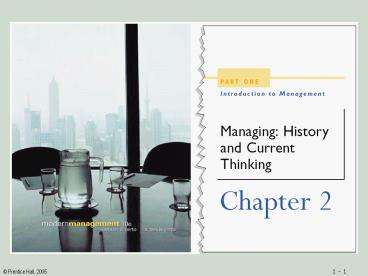Modern Management, 10e (Certo) - PowerPoint PPT Presentation
1 / 18
Title:
Modern Management, 10e (Certo)
Description:
Prentice Hall, 2005. 1 - 3. The Classical Approach. Lower-Level Management Analysis ... Prentice Hall, 2005. 1 - 9. The Management Science Approach ... – PowerPoint PPT presentation
Number of Views:185
Avg rating:3.0/5.0
Title: Modern Management, 10e (Certo)
1
(No Transcript)
2
Objectives
- 1. An understanding of the classical approach to
management - 2. An appreciation for the work of Frederick
W.Taylor, Frank and Lillian Gilbreth, Henry L.
Gantt, and Henri Fayol - 3. An understanding of the behavioral approach
to management - 4. An understanding of the studies at the
Hawthorne Works and the human relations movement - 5. An understanding of the management science
approach to management - 6. An understanding of how the management
science approach has evolved - 7. An understanding of the system approach to
management - 8. Knowledge about the learning organization
approach to management - 9. An understanding of how triangular management
and the contingency approach to management are
related
3
The Classical Approach
- Lower-Level Management Analysis
- Frederick W.Taylor (18561915)
- Work at Bethlehem Steel Co.
- Frank Gilbreth (18681924) and Lillian Gilbreth
(18781972) - Motion study
- The Right Way
- The Wrong Way
- Henry L. Gantt (18611919)
- Scheduling Innovation
- Rewarding Innovation
4
The Classical Approach
5
The Classical Approach
6
The Classical Approach
- Comprehensive Analysis of Management
- Henri Fayol (18411925)
- 1. Division of work
- 2. Authority
- 3. Discipline
- 4. Unity of command
- 5. Unity of direction
- 6. Subordination of individual interests to the
general interests - 7. Remuneration
- 8. Centralization
- 9. Scalar chain
- 10. Order
- 11. Equity
- 12. Stability of tenure of personnel
- 13. Initiative
- 14. Esprit de corps
- Limitations of the Classical Approach
7
The Behavioral Approach
- The Hawthorne Studies
- The Relay Assembly Test Room Experiments
- The Bank Wiring Observation Room Experiment
- Recognizing the Human Variable
8
The Behavioral Approach
- The Human Relations Movement
- Understand
- Physiological
- Safety
- Social
- Esteem
- Self-actualization
- People can be
- Self-directed
- Accept responsibility
- Consider work to be as natural as play
9
The Management Science Approach
- The Beginning of the Management Science Approach
- 1. Observe
- 2. Construct
- 3. Deduce
- 4. Test
10
The Management Science Approach
- Management Science Today
- Characteristics of Management Science
Applications - 1) Problems studied are complicated
- 2) Economic implications as guidelines
- 3) Mathematical models to investigate the
decision situation - 4) Use of computers
11
The Contingency Approach
- 1. Perceiving organizational situations as they
actually exist - 2. Choosing the management tactics best suited to
those situations - 3. Competently implementing those tactics
12
The System Approach
- Types of Systems
- Closed
- Open
13
The System Approach
- Systems and Wholeness
- 1. The whole should be the main focus of analysis
- 2. Integration is the key variable in wholeness
analysis - 3. Modifications weighed in relation to effects
on every other part - 4. Each part has some role to perform
- 5. Part and its function determined by its
position in the whole - 6. All analysis starts with the existence of the
whole
14
The System Approach
- The Management System
- Information for Management System Analysis
- Triangular management
- 1. Classical approach
- 2. Behavioral approach
- 3. Management science approach
15
The System Approach
16
The System Approach
17
Learning OrganizationA New Approach?
- 1. Systems Thinking
- 2. Shared Vision
- 3. Challenging of Mental Models
- 4. Team Learning
- 5. Personal Mastery
18
- ?
Questions































